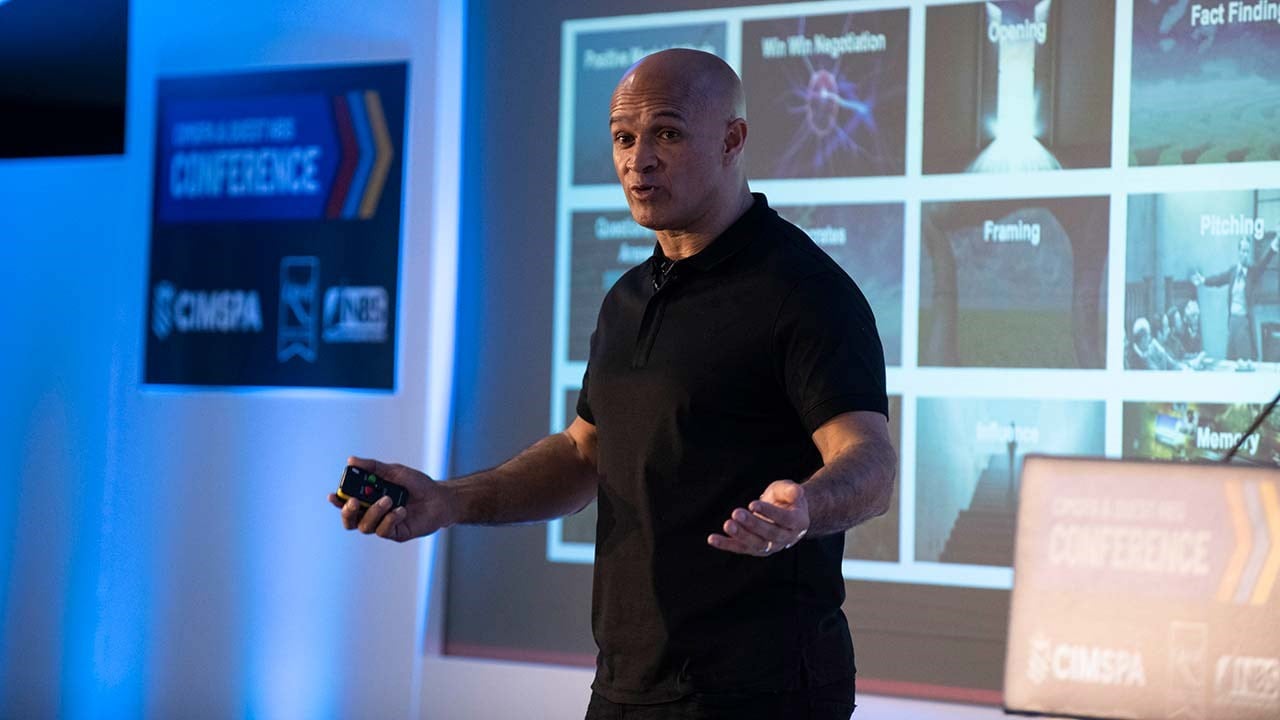Unlocking the potential of our sector
David Thompson
Behaviour Change Advocate
Persuasion and influence in the sport and physical activity sector
David Thomson delivered a rousing morning keynote about the science of persuasion and influence.
After a tough childhood with alcoholic parents and time spent in children’s homes, David joined the British Army at 16 to “learn about growing up”. After returning to civilian life at the age of 21, David began selling mortgages and started studying the art of persuasion. He became a leading financial advisor, built a business and sold it to become a multi-millionaire. Today, David is one of only 18 instructors trained and endorsed by Dr. Robert Cialdini and one of six people licensed to deliver Cialdini’s latest ‘pre-suasion’ techniques which allows you to pre-determine how you would like people to receive your message before you’ve even delivered it.
In order to understand the influence and persuasion, it is vital that we appreciate that people are primarily interested in themselves. Every conversation and interaction we have therefore, needs to address the questions of: So what? Who cares? What’s in it for me?
Cialdini’s six principles of persuasion
Once we understand this, we can learn and apply Cialdini’s six principles of persuasion:
- Reciprocity
- Liking
- Consensus
- Authority
- Consistency
- Scarcity
David defined reciprocity as the obligation to give back to others the same type of behaviour we have received. Translating this to the gym environment, he said this means that instead of thinking how you can sell to people walking into your facility, you should think about how you can help them. If you help them, they will feel obligated to you.
Building on this, David also encouraged the audience to think about what gift they could give people to help form a relationship. Studies have shown that gifts are more powerful than rewards. When consulting for McDonald’s in South America, David and his team were able to increase family sales by 25% and associated sales by 20%, simply by giving children a balloon when they entered the restaurant (a gift) rather than when they left (a reward), which they had done previously. Operators therefore may want to consider giving items such as water bottles and towels before rather than after people have signed up as members – and don’t forget about intangible gifts such as time, advice and listening.
David said “It’s time for the sector to stop selling memberships and start selling the type of change that people can believe in."
He shared six questions, which he said, have already made a huge difference to personal trainers who are using them with their clients:
- Why might you change?
- On a scale of 1-10, how ready are you for change?
- Why didn’t you pick a lower number?
- Imagine you’ve changed, what would the positive outcomes be?
- Why are those outcomes important to you?
- What, if any, is the next step?
David continued, “Here’s what happens when you ask these questions. You are not selling on price anymore – they are now coming to you for more than one reason. This system, if you do it properly, will take you seven minutes or less and will give you instant influence. It’s super powerful and super practical. I know it works because I’ve used it. Consistency and commitment is probably the most powerful part of being persuasive."
Getting people – clients, students, staff – to set ‘public’ goals has been proven to help. If people set a goal and share that goal with others, they are far more likely to succeed than those who set a private goal.
Six ‘magical’ steps for gym owners
To extend the power of goal-setting, David encouraged the audience to take six ‘magical’ steps after someone has thanked them for something.
- Ask your client to recommend you if they are still happy with your work in 12 months’ time.
- 11 months later, contact the client and remind them of their conversation and commitment to recommend you.
- On the one year anniversary, ask the client to make the recommendation.
Contact the recommendation. Tell the client and thank them for the recommendation. - After your first appointment with the recommendation, go back to the client that recommended you and tell them how well the appointment went.
When the recommended client has had their first gym session and signs up, contact the original client again and thank them. The likelihood is that this client will have another recommendation for you, and so it goes on. - David made a point of noting “You need to get people working for you. If you keep the people you’ve got and they recommend one extra person, your business will double. If you get two extra people, it trebles. And if you get more, your business goes ballistic. Mine went ballistic, because I got people to recommend me."
- David explained that we need to train our people in pitching, closing, negotiation, positive mental attitude, NLP and all the other elements of science of persuasion and influence, if we want them to persuade people to join our facilities and influence them to change their lives.
Finishing his presentation, David said “Spending time on this education can make a huge difference to our business. If we learn the science of persuasion and influence, we can change our lives and if we teach our kids, they can change the world.”
